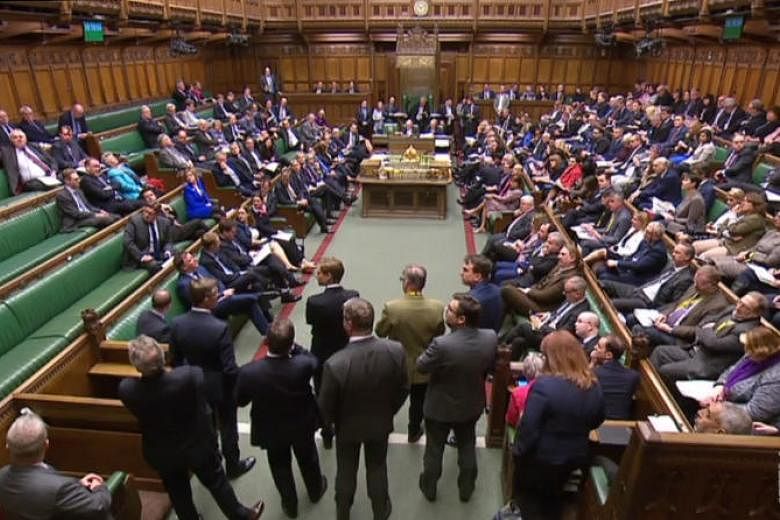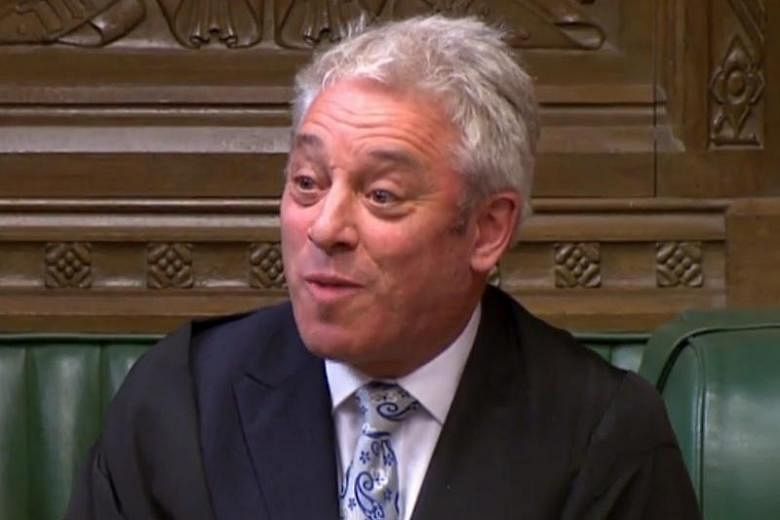LONDON - A hard Brexit may be increasingly likely, as lawmakers in Britain have failed to back any alternative Brexit proposals for a second time, leaving Parliament no clearer on a way forward on how to tackle the process of Britain's departure from the European Union.
MPs rejected all of the four options that were tabled late on Monday (April 1). The options ranged from proposals for a softer Brexit such as staying in the EU's single market with a Norway-style relationship, better known as Common Market 2.0, to holding a confirmatory public vote on Brexit options.
The other options put forward were a permanent customs union with the EU, as well as the option to revoke Article 50 and halt Brexit altogether, in a bid to avoid a no-deal exit should the political paralysis continue.
Keeping Britain in a customs union with the EU was defeated by just three votes - 273 to 276 votes.
Last week, lawmakers took control of Brexit proceedings and voted on eight alternatives, but there was no majority for any option. Monday was the second round of debates and indicative votes.
Britain is set to depart the EU on April 12 after Parliament rejected Prime Minister Theresa May's divorce deal for a third time last Friday. Her deal was voted down by a historic margin in January, and again in March. The EU had earlier granted a two-week extension to the original March 29 Brexit date.
Parliament remains deeply divided over Brexit, with some lawmakers pushing for a customs union with the EU, and others adopting a more hardline eurosceptic stance.
The deadlock leaves a beleaguered Mrs May, who has said she would step down before the next step of the Brexit negotiations, at a crossroad, with possibilities of everything from a general election to a lengthy delay on the cards.
Mrs May has until the new legal default Brexit day of April 12 to put forth a credible proposition to the EU for any extensions, or leave the bloc without a deal in 10 days.
However, Brexit Secretary Steve Barclay indicated that the government may hold a fourth vote on her divorce deal this week, of which the outcome will be crucial to whether Britain will need to participate in the next round of European parliamentary elections in May.
Some critics suggest that Mrs May may have some momentum on her deal, given that the House could not agree on any of the alternatives.
Mrs May will convene with her Cabinet on Tuesday to discuss plans. The meeting is likely to last five to six hours.
Meanwhile, MP Nick Boles announced his resignation from the Conservative Party and walked out of the chamber at the House of Commons after his proposal for a Common Market 2.0 was defeated.
Under his alternative plan, Britain would leave the EU but retain freedom of movement and make contributions to the EU budget. It would join the European Free Trade Association and European Economic Area.
Mr Boles said: "I accept that I have failed. I have failed chiefly because my party refuses to compromise."
Addressing the House after the results, opposition leader, Labour Party's Jeremy Corbyn, said that the House should consider bringing back the alternatives for a third debate on Wednesday.
European Commission president Jean-Claude Juncker warned that the bloc's patience is wearing thin and urged Britain to come to a decision within hours or days.
"We have had a lot of patience with our British friends, but patience also runs out, comes to an end," Mr Juncker told Italian broadcaster RAI on Sunday.
After the results of the votes were announced on Monday, European Parliament Brexit chief and a former prime minister of Belgium Guy Verhofstadt highlighted the high chance of a hard Brexit for Britain.
He tweeted: "The House of Commons again votes against all options. A hard Brexit becomes nearly inevitable. On Wednesday, the UK has a last chance to break the deadlock or face the abyss."
European leaders will convene on April 10 for a summit.













